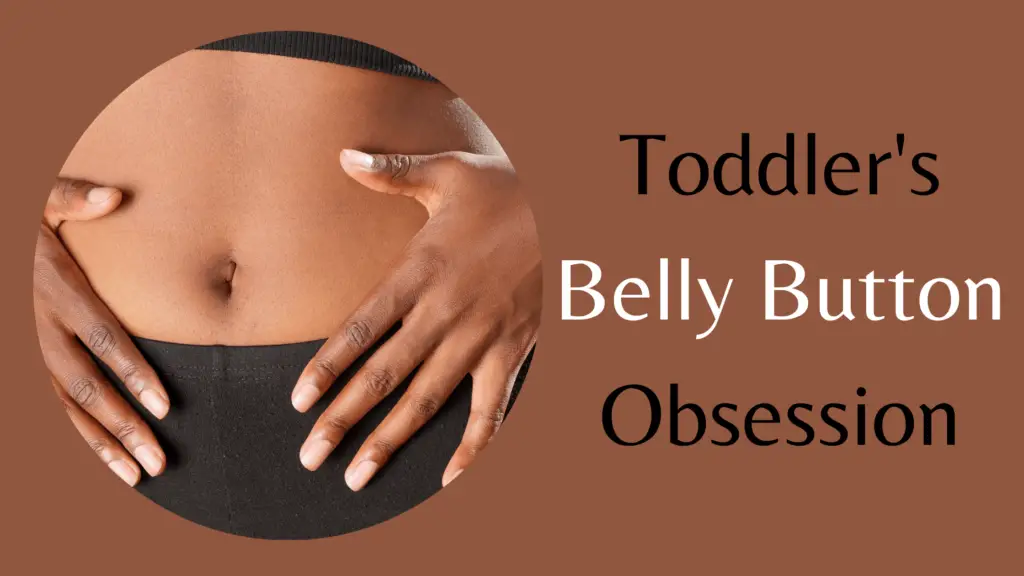Parenting is a remarkable journey filled with countless surprises, and one of those surprises might just be your toddler’s newfound fascination with your belly button. It can leave you scratching your head, wondering why something as seemingly ordinary as a belly button could captivate your child’s attention so profoundly. This has made some parents, especially first time parents, to wonder: why is my toddler obsessed with my belly button.
Toddler’s Fascination with Body Parts
Toddlers are miniature adventurers, setting out on a voyage of self-discovery while unraveling the mysteries of the world around them. Their unquenchable curiosity knows no limits, encompassing an inquisitiveness about their own physical forms. During this stage of growth, they are not only driven to explore but also enthusiastically seek knowledge about the intricacies of their body and its functions.
Toddlers possess an innate curiosity that propels their early development. As they continue to mature and gain awareness of their bodies and environment, they eagerly delve into the exploration of various body parts, both their own and those of their caregivers. This exploration constitutes an essential aspect of their learning journey, aiding in comprehending the world, honing fine and gross motor skills, and establishing a sturdy foundation for future educational pursuits.
Beyond the Belly Button
Although the belly button may seem to steal the spotlight, it’s crucial to acknowledge that toddlers harbor an equal fascination for various other body components. Their hands, feet, ears, and even the peculiar sounds emanating from their noses can easily capture their curiosity. This keen interest in body parts represents a natural and wholesome facet of their overall growth.
The exploration of body parts plays a pivotal role in a toddler’s developmental journey. It serves as a means for them to acquire a deeper comprehension of their own physicality and its functionalities. Whenever your toddler embarks on an exploration of your belly button or any other bodily feature, they actively engage in sensory learning, refine their fine motor skills, and foster the development of their language abilities.
Why Is My Toddler Obsessed With My Belly Button
So, why is my toddler obsessed with my belly button? Why not other body parts? The fascination with belly buttons can be attributed to several factors. First and foremost, the belly button is unique and easily accessible for toddlers. Unlike some other body parts, it’s right there in plain sight, making it an ideal object of curiosity.
The belly button is a particularly intriguing body part for toddlers due to its accessibility and uniqueness. Unlike other body parts that might be hidden under clothing or difficult to reach, the belly button is readily visible and easy for them to touch and explore. Its distinctive appearance, often resembling a small indentation or button, further adds to its allure.

Briefly, there are three key reasons why toddlers can be obsessed with your belly button. These are:
- Curiosity: Toddlers are naturally curious about their bodies and the world around them. They are also learning about different body parts and how they work. Your belly button is a unique and interesting feature of your body, so it’s no wonder that toddlers are fascinated by it.
- Self-soothing: For some toddlers, playing with their belly button can be a way to self-soothe. It can feel calming and comforting, especially when they are feeling anxious or stressed.
- Attention-seeking: Toddlers also love getting attention from their parents. If they notice that you react to them touching their belly button, they may continue to do it to get a rise out of you.
Cultural and Societal Factors
Cultural and societal factors may also contribute to the fascination with belly buttons. In some cultures, the belly button holds symbolism and significance, which can be passed down through generations. The portrayal of belly buttons in media and popular culture can further pique a toddler’s interest.
The cultural and societal aspects of belly button fascination can vary widely. In some cultures, the belly button holds special significance, often tied to beliefs about the origin of life or as a symbol of connection between mother and child. These cultural beliefs can influence a child’s perception and curiosity about their own or others’ belly buttons.
Developmental Milestones
The Role of Cognitive and Sensory Development
Toddlers are undergoing a swift evolution in their cognitive and sensory capacities. Their brains act like sponges, voraciously soaking up information at an astonishing pace. This phase of development spurs them to embark on explorations of their environment, which includes an inquisitive examination of their parents’ bodies as a means of grasping the intricacies of the world.
Cognitive and sensory development play a pivotal role in a toddler’s fascination with body parts. As they continue to mature, their awareness of their own bodies and the surrounding world intensifies. Their cognitive abilities, encompassing memory and problem-solving skills, enhance significantly, empowering them to establish connections and seek explanations for the phenomena they encounter.
Tactile Exploration
Toddlers learn through touch, and the tactile experience of poking or prodding your belly button helps them grasp concepts like texture, shape, and depth. It’s a sensory adventure that contributes to their overall understanding of their physical environment.
Tactile exploration is a fundamental aspect of toddler development. When a toddler touches your belly button, they are engaging in sensory learning. They are not only feeling the texture of your skin but also learning about the depth and shape of the belly button itself. This tactile experience is crucial for building their understanding of the world and refining their fine motor skills.
Communication and Bonding
Interestingly, your toddler’s interest in your belly button can be a form of communication. They may not have the vocabulary to express their curiosity verbally, so they use their actions instead. By showing interest in your belly button, they are engaging with you and seeking your attention and guidance.
Communication is at the heart of a toddler’s development. While they may not yet have the words to express their thoughts and feelings fully, they are constantly communicating through their actions and behaviors. When your toddler reaches for your belly button or points to it, they are sending a message, often seeking interaction and connection.
Strengthening the Parent-Child Bond
Embracing your child’s curiosity and responding positively can strengthen your parent-child bond. It’s a unique opportunity to connect with your toddler on a deeper level. By providing thoughtful responses and engaging in their exploration, you can foster trust and open communication.
Building a strong parent-child bond is essential for a child’s emotional and social development. When you respond positively to your toddler’s curiosity, you are sending them the message that their questions and interests are valid and worthy of attention. This validation can boost their self-esteem and confidence.
Read About: How to Make your Child Feel Loved and Valued
Tips for Positive Responses
When your toddler’s curiosity leads them to your belly button, consider these tips for positive responses:
- Encourage questions: Welcome their inquiries and provide age-appropriate answers.
- Gentle redirection: If their fascination becomes intrusive or uncomfortable, gently redirect their attention to another activity.
- Share stories: Share simple, age-appropriate stories about belly buttons to satisfy their curiosity.
These tips can help you navigate your toddler’s curiosity while maintaining a positive and supportive atmosphere.
Curbing Inappropriate Behavior
Setting Boundaries
While encouraging curiosity is essential, it’s equally important to set boundaries when necessary. If your toddler’s fascination with your belly button becomes too intrusive or uncomfortable, gently communicate your boundaries. Explain that while it’s okay to be curious, there are appropriate ways to express it.
Setting boundaries is a crucial aspect of parenting. It helps children understand what behavior is acceptable and what isn’t. When it comes to their fascination with your belly button, it’s essential to communicate when their actions cross a line. For example, if they start poking or prodding too aggressively, calmly let them know that it’s uncomfortable for you.

Redirecting in a Respectful Manner
Redirecting their curiosity is a valuable skill. Offer alternative activities or objects that can capture their interest and provide a safer outlet for exploration. Redirecting their focus can be a win-win for both you and your toddler.
Redirecting their attention in a respectful manner can be an effective way to address inappropriate behavior. For example, if they are fixated on your belly button in a way that makes you uncomfortable, you can gently suggest a different activity or toy to explore together. Redirecting their focus allows them to satisfy their curiosity in a more appropriate manner.
Teaching Personal Boundaries and Consent
As parents, we have a responsibility to teach our children about personal boundaries and consent from a young age. Use moments of curiosity about body parts as teaching opportunities. Explain that it’s essential to respect personal space and ask for permission before touching someone else’s body.
Teaching personal boundaries and consent is a fundamental aspect of your child’s social and emotional development. It lays the groundwork for healthy relationships and helps them understand the importance of respecting others’ boundaries. When your toddler expresses curiosity about body parts, seize the opportunity to reinforce these crucial lessons.
Read About: Why Does My Toddler Hate Me
Encouraging Healthy Curiosity
To nurture your toddler’s curiosity about body parts, including the belly button, consider age-appropriate books and resources. Look for materials that offer simple explanations and engaging visuals to help them understand their bodies better.
Age-appropriate resources can be wonderful tools for satisfying your toddler’s curiosity. Seek out books, videos, or interactive apps that are designed to introduce children to their bodies in an educational and engaging way. These resources often use playful language and colorful illustrations to make learning fun.
Ideas for Safe and Educational Activities
Engaging in activities that satisfy your toddler’s curiosity in a safe and educational way can be both fun and rewarding. Try the following:
- Body-themed art projects: Create art that celebrates the human body, including finger painting or making handprint art.
- Sensory play: Set up sensory bins with materials like sand, rice, or playdough for tactile exploration.
- Bath time fun: Use bath time as an opportunity to teach about body parts in a playful manner.
These activities provide hands-on learning experiences that can capture your toddler’s interest while promoting their overall development.
Fostering a Positive Body Image
Lastly, it’s crucial to foster a positive body image from a young age. Encourage your toddler to appreciate and respect their own body and the bodies of others. Teach them that all bodies are unique and beautiful.
Fostering a positive body image is a lifelong gift you can give your child. By celebrating the beauty and uniqueness of their own body and others’, you help them develop a healthy self-esteem and a respectful attitude toward diversity. Use positive language when discussing bodies and emphasize the importance of self-acceptance and self-love.
Conclusion
In the grand tapestry of toddlerhood, a fascination with your belly button is just one colorful thread. Understanding the reasons behind your child’s curiosity is the first step towards embracing it as a natural part of their development. As parents, we have the privilege of nurturing their curiosity, setting healthy boundaries, and fostering positive communication. Remember, your child’s fascination with your belly button is not only a sign of their growing curiosity but also an opportunity to bond and educate.







